|
|
Post by duwayne on Feb 17, 2024 15:28:08 GMT
The multivariate ENSO (MVENSO) values have been much lower than the ENSO numbers reported elsewhere. Currently the value is 0.7 for Dec/Jan and the max was 1.1.
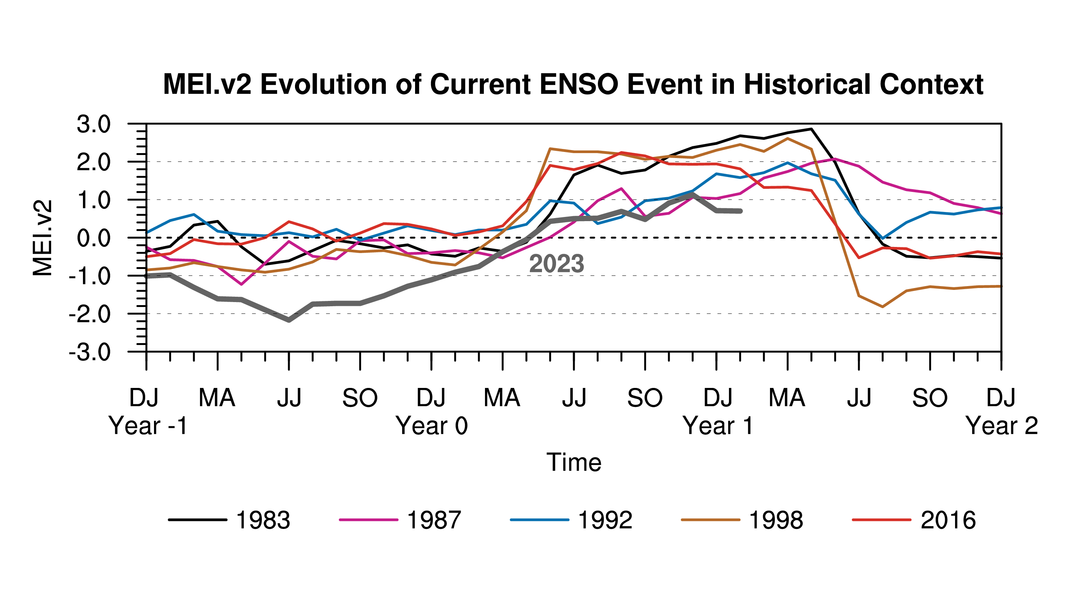
|
|
steve
Level 2 Rank
 
Posts: 77
|
Post by steve on Feb 17, 2024 19:57:43 GMT
In preparation for a La Nina tornado season? I am kind of in the bullseye. Ratty, might need to borrow your "Do not like" button. |
|
|
|
Post by ratty on Feb 17, 2024 21:27:55 GMT
In preparation for a La Nina tornado season? I am kind of in the bullseye. Ratty, might need to borrow your "Do not like" button. You're welcome. He started with 'warming up dramatically' and 'strong El Nino' and averaging three years. Should I bother watching the rest?  |
|
|
|
Post by missouriboy on Feb 18, 2024 1:17:19 GMT
Something amiss in the non-tropical ingredients of the MEI.v2 recipe. But which?
The multivariate ENSO (MVENSO) values have been much lower than the ENSO numbers reported elsewhere. Currently the value is 0.7 for Dec/Jan and the max was 1.1.

|
|
|
|
Post by code on Feb 18, 2024 3:41:48 GMT
Is there a past year we have on record that closely matches 2023?
|
|
|
|
Post by nonentropic on Feb 18, 2024 14:57:52 GMT
Maybe an eruption and stratospheric MC
|
|
|
|
Post by missouriboy on Feb 18, 2024 23:23:23 GMT
Is there a past year we have on record that closely matches 2023? Depends on what you mean by "close". Someone could probably write a dissertation on your simple question. We have noted here how closely (in terms of solar activity) SC24 and SC25 have been to SC12 and SC13. A comparison year to now looks like 1894. In 1894 the Florida orange industry was devastated. The 1893-94 US "Panic" is rated as one of the worst economic downturns in US history. Must be others. Perhaps someone could find some others. As Mr Twain pointed out, history may not repeat ... but it may rhyme.
2019 and 2023 gave us two very large positive IOD events in the Indian Ocean.
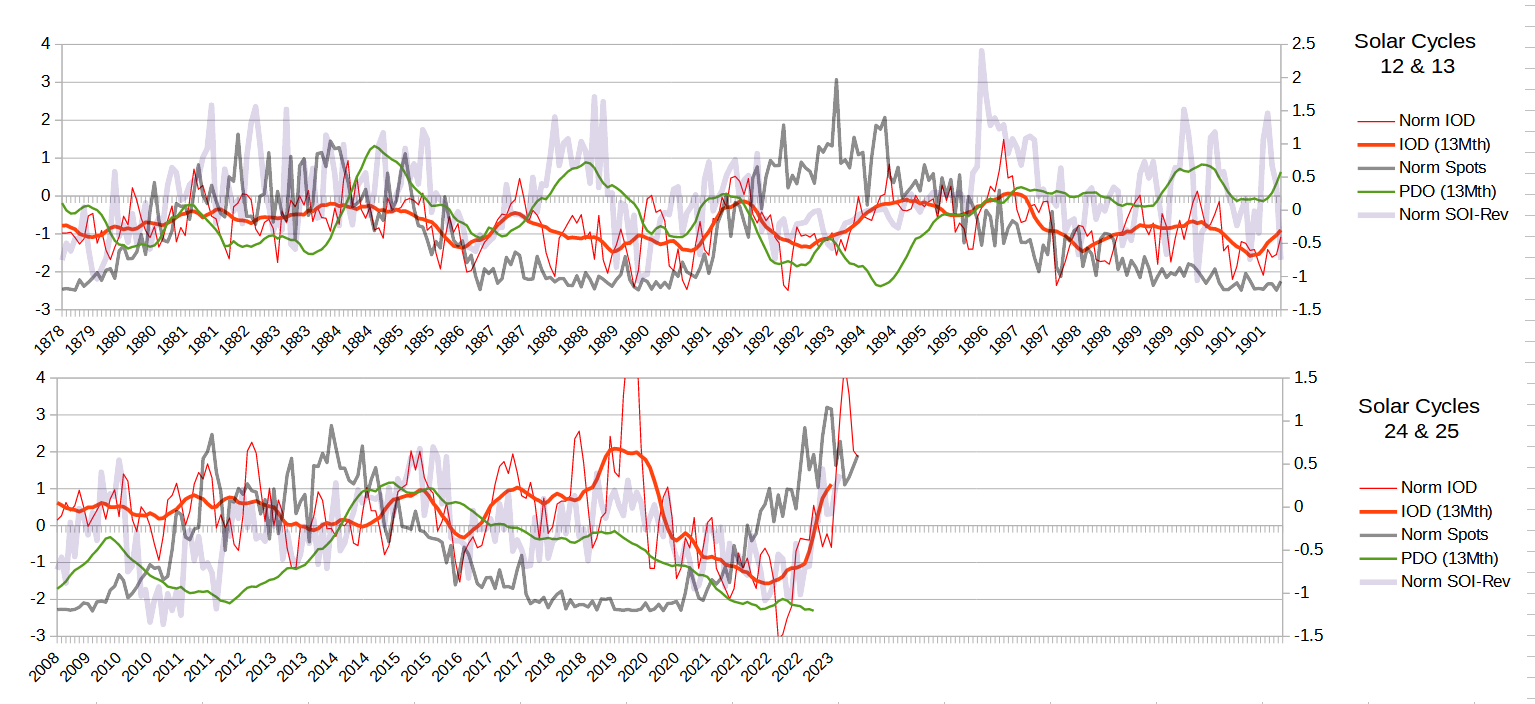 |
|
|
|
Post by blustnmtn on Feb 19, 2024 16:26:56 GMT
Is there a past year we have on record that closely matches 2023? Depends on what you mean by "close". Someone could probably write a dissertation on your simple question. We have noted here how closely (in terms of solar activity) SC24 and SC25 have been to SC12 and SC13. A comparison year to now looks like 1894. In 1894 the Florida orange industry was devastated. The 1893-94 US "Panic" is rated as one of the worst economic downturns in US history. Must be others. Perhaps someone could find some others. As Mr Twain pointed out, history may not repeat ... but it may rhyme.
2019 and 2023 gave us two very large positive IOD events in the Indian Ocean.
 12 and 13 were just coming out of the LIA. Considering the heat sink capacity of the oceans, I think 24 and 25 are fueling a fairly different climate state for ENSO. What do you think? |
|
|
|
Post by missouriboy on Feb 20, 2024 15:52:22 GMT
Depends on what you mean by "close". Someone could probably write a dissertation on your simple question. We have noted here how closely (in terms of solar activity) SC24 and SC25 have been to SC12 and SC13. A comparison year to now looks like 1894. In 1894 the Florida orange industry was devastated. The 1893-94 US "Panic" is rated as one of the worst economic downturns in US history. Must be others. Perhaps someone could find some others. As Mr Twain pointed out, history may not repeat ... but it may rhyme.
2019 and 2023 gave us two very large positive IOD events in the Indian Ocean.
 12 and 13 were just coming out of the LIA. Considering the heat sink capacity of the oceans, I think 24 and 25 are fueling a fairly different climate state for ENSO. What do you think? Actually, none of the data above is an "actual" temperature measurement. IOD and PDO are more a measure of warm water positioning (west or east) ... while SOI is a 2-station pressure difference measure that correlates well with ENSO values. Ocean temperature "measurements" since the Challenger voyage (1872-76) suggest that ocean temperatures had risen by perhaps 0.6 C in the 135-year period since the start of solar cycle 12. Even the "Catastrophists" grudgingly admit that solar inputs "may" warm the oceans ... and that the "Big Hot Tub" "may" heat (or cool) the atmosphere. So yes ... the base state of the oceans have changed between SC12-13 and SC24-25. SC12-13 followed a set of 4 strong solar cycles. SC24-25 follow a set of 6 strong solar cycles with a weaker one in the middle. The IOD was consistently negative across SC12-13 while it has been more consistently positive during SC24-25. The Reverse SOI and PDO were more positive in SC12 than in SC24. We will see.
www.livescience.com/19414-oceans-warming-135-years.html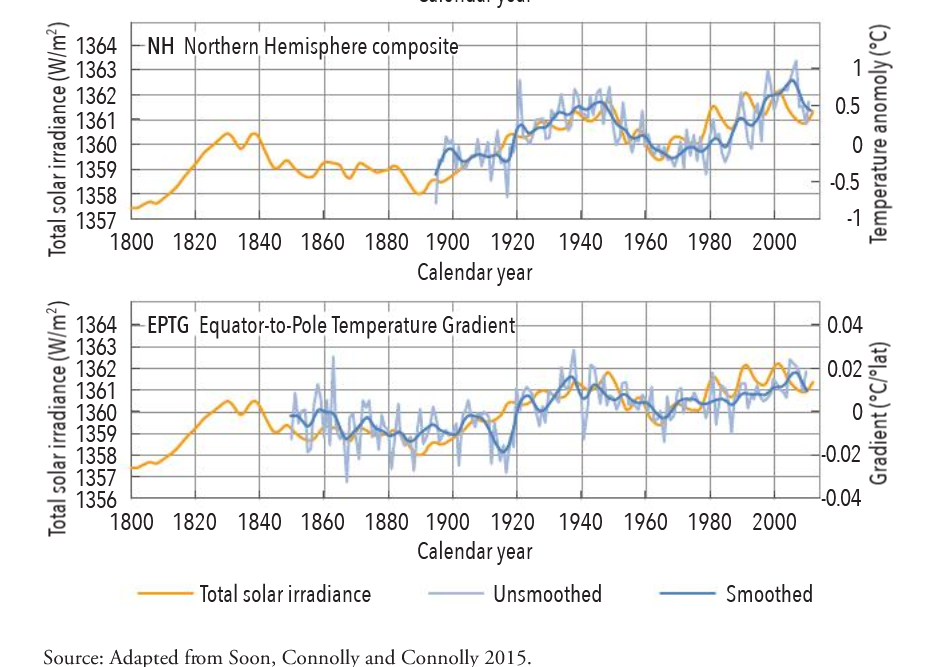 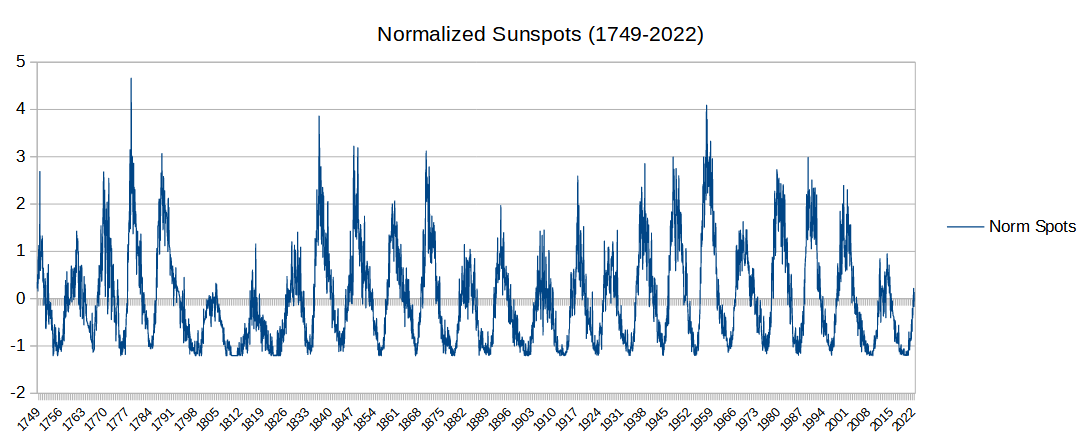 |
|
|
|
Post by missouriboy on Feb 20, 2024 22:56:43 GMT
A Proposition on how negative IOD events at the beginning of a solar cycle are coincident with the start of El Ninos. - Check back as I will be expanding.
Observations ENSO events at the beginning of every solar cycle start with a pulse of warm water from the eastern Indian Ocean during a negative IOD event (Charts 1a and 1b).. Every such event since 1979 can be seen in monthly equatorial cross-sections - GODAS charts ( www.cpc.ncep.noaa.gov/products/GODAS/monthly.shtml ). Every such beginning looks very similar to the one below at the start of solar cycle 24. They can be traced monthly in the GODAS images as the subsurface wave moves eastward and surfaces in the Eastern Pacific.
Note that the IOD generally runs in opposition to the PDO. Positive IOD (Indian Ocean warmer in the west - Positive PDO warmer N. Pacific in the east.
Three cycles stand out with unusual IOD progressions: SC13, SC19 and SC25. Each of these are about 70 years apart. They have a negative IOD progression slope across most of the first half of the active part of the solar cycle.
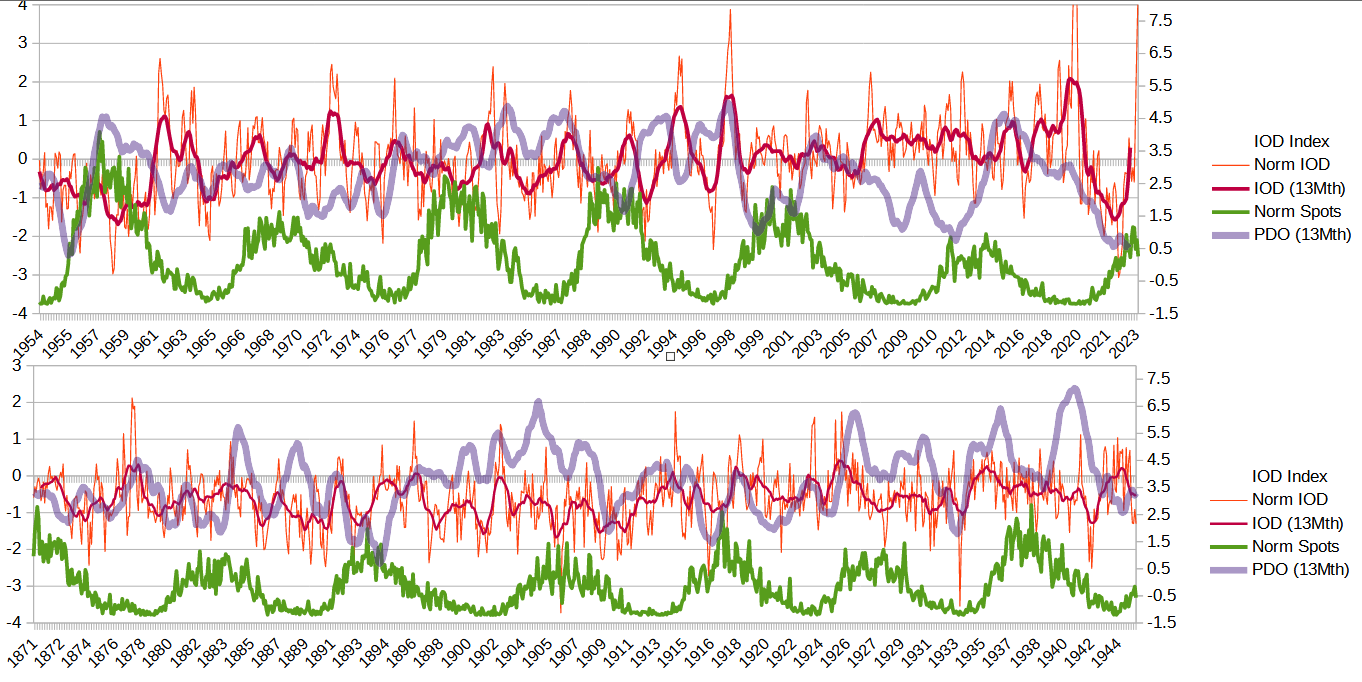 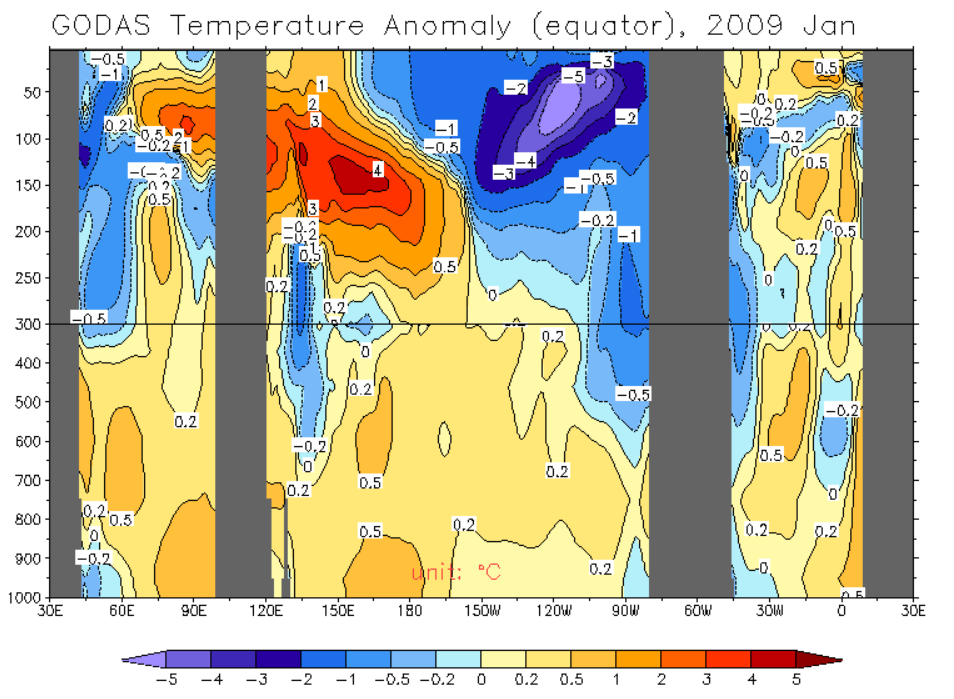 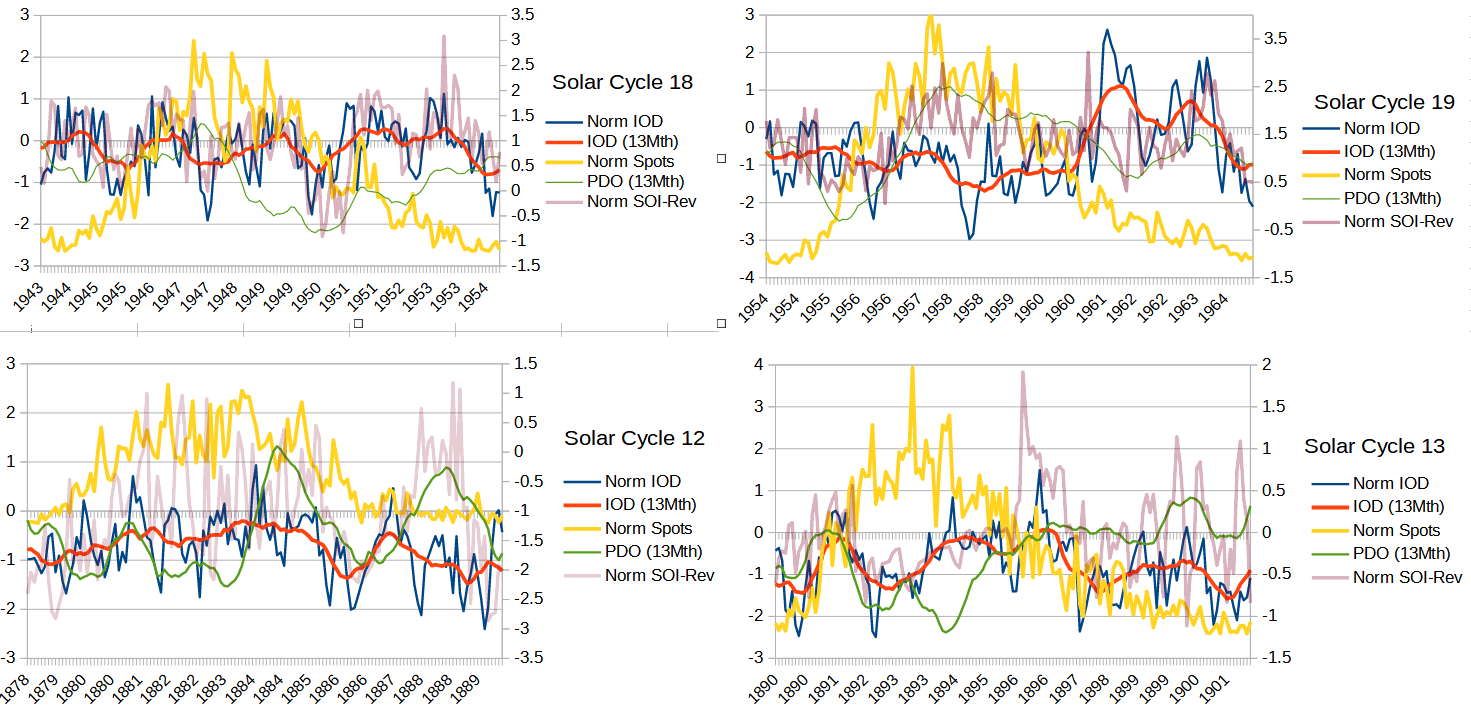 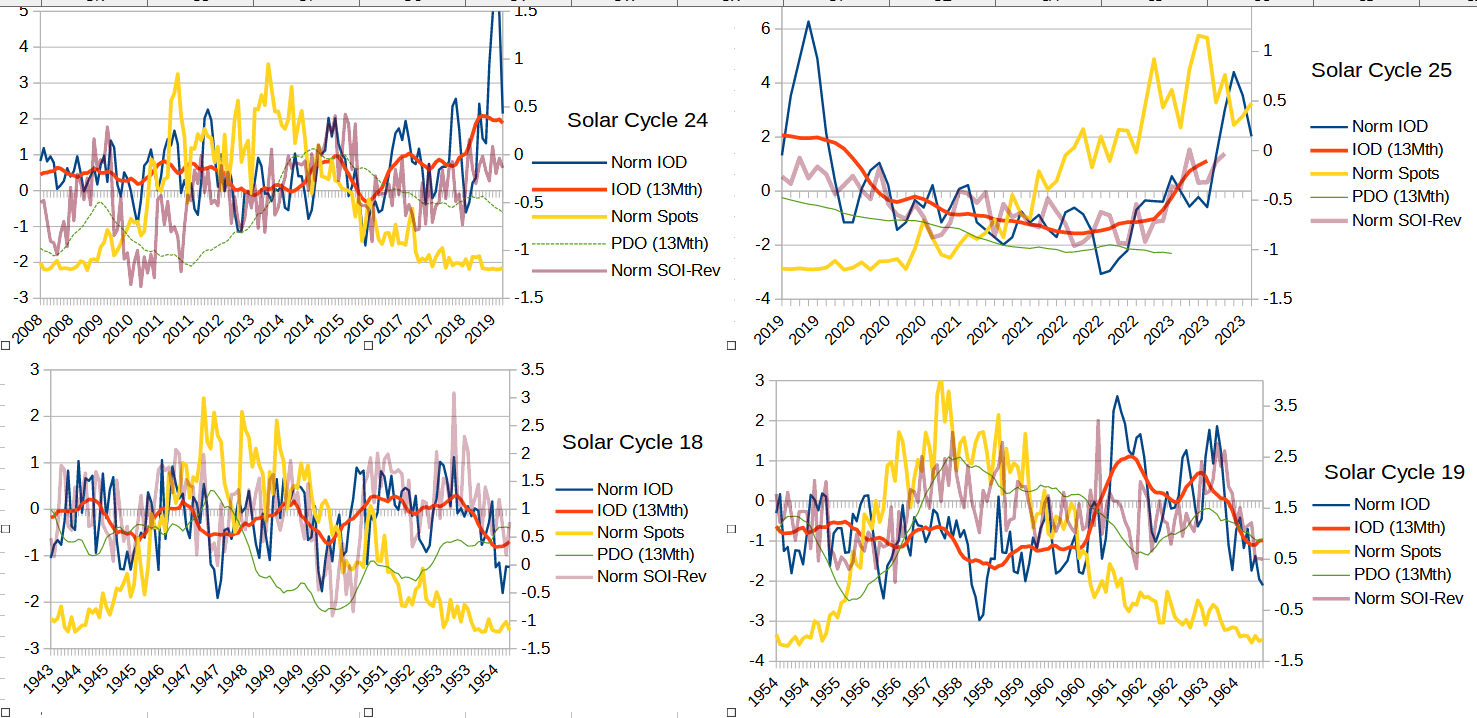 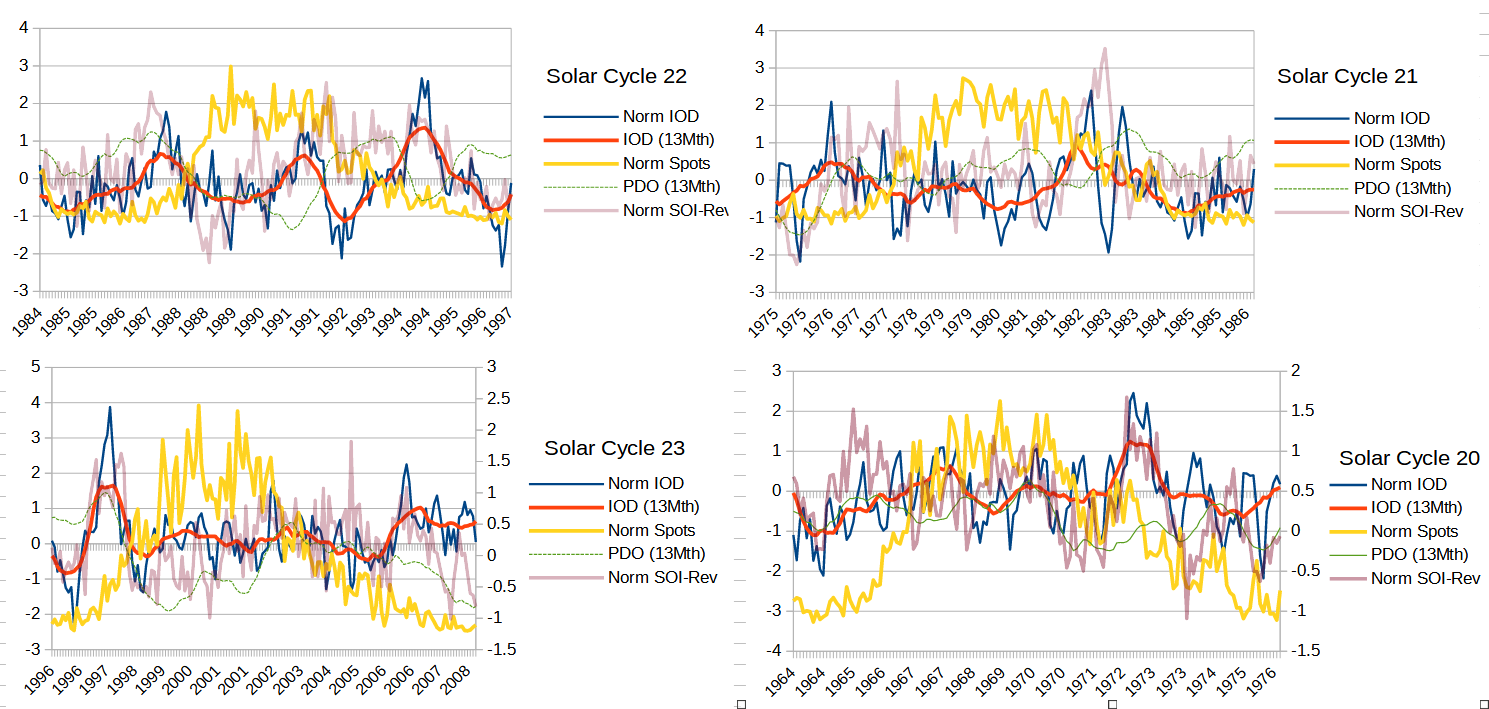 |
|
|
|
Post by ratty on Feb 21, 2024 8:17:32 GMT
Thank you Missouri.  |
|
|
|
Post by blustnmtn on Feb 21, 2024 15:10:14 GMT
I need a bit of time to digest this....Great effort Mo'boy!
|
|
|
|
Post by blustnmtn on Feb 22, 2024 12:52:11 GMT
|
|
|
|
Post by code on Feb 22, 2024 16:35:27 GMT
Even the "Catastrophists" grudgingly admit that solar inputs "may" warm the oceans
Love the wording...
|
|
|
|
Post by missouriboy on Feb 25, 2024 22:53:31 GMT
|
|